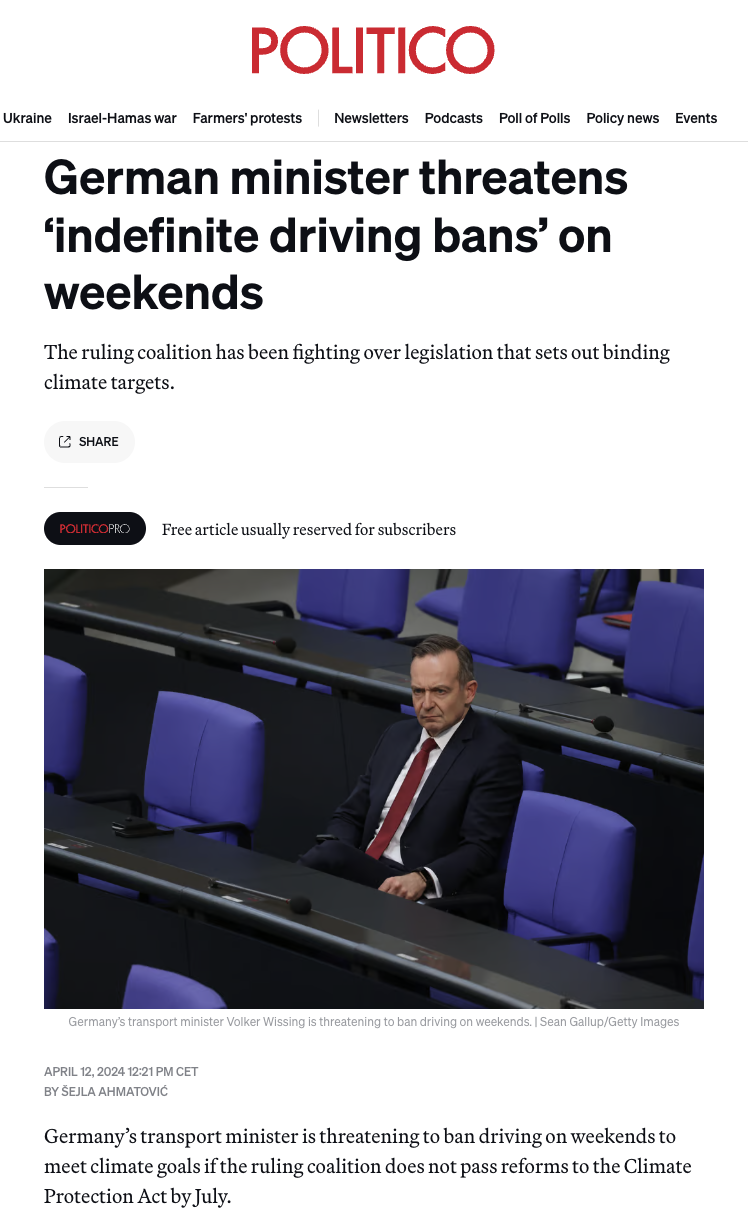Motorised road vehicle transportation is responsible for about 80% of the rise in global emissions over the past 50 years.
Cars are the problem, not the answer. There is no reason we cannot build an accessible car-free society that works for everyone.https://t.co/8hIdM8ohHY
— Eric Holthaus (@EricHolthaus) May 21, 2020
Clarifying this tweet, it should be 'road vehicle transportation is responsible for about 80% of the rise in global *transportation* emissions over the past 50 years' (thanks @GlobalEcoGuy)https://t.co/exsW9JMAV1
— Eric Holthaus (@EricHolthaus) May 22, 2020
https://thecorrespondent.com/463/streets-are-for-people-not-cars/61295013857-50a961e7
Excerpt: Taking back cities from cars has been a cause for urban activists for decades, but in an era of social distancing, the movement has become urgent as a counterbalance to isolation and to closures of public infrastructure, like parks and buses. We know that a liveable future will mean one with fewer cars, but it’s still an open question if cities will see it the same way, or double down on the past. The modern open streets movement – ciclovía – got its start in Bogotá, Colombia, in the 1970s Read more about ciclovía.to counteract the global spread of an alliance between car companies and the fossil fuel industry
Read more about the birth of the interstate highway system.that gave birth to monstrous highway systems in the US and Europe in the 1950s and 60s. Now, amid the pandemic, the movement to ban cars from key streets is rapidly spreading around the world, from New York
New York is planning to close 75 miles of streets to vehicle traffic.to Mumbai.
…
The open streets movement is part of the climate movement, because motorised road vehicle transportation is responsible for about 80% of the rise in global emissions over the past 50 years.
Read WRI’s roundup of the stats on global transportation emissions.In many ways, the climate problem is primarily one of figuring out how to move ourselves from place to place using the least amount of fossil fuels possible.
…
But the open streets movement is just beginning. Once the lockdown is over, there need to be vigorous campaigns to make pedestrian-focused streets the norm, not the exception. Bike commuting, not socially-isolated recreation, will drive the adoption of bike-friendly cities. Cities can’t make this transition simply by adding bike lanes,
Read why bike lanes are bad, actually, from CityLab.they have to reinvent themselves for a car-free era. And that’s where the hope lies: with some effort, on the other side of this pandemic, our cities could become radically bike friendly, right away.
I can get in my car and immediately drive to any location. Waiting for a bus takes up to an hour on Sundays, 15 minutes on other days. I can carry much more groceries by car than I can by hand . My car has 2 catalytic converters. The atmosphere needs more CO2 NOT less.
— Alan Tomalty (@ATomalty) May 21, 2020
There is a reason – people really like their cars.
And they're going to fight back if you try to take them by decree or by force.
— Bodie MacGovern (@bomac_macbo) May 22, 2020
Personal transport has been the greatest single advancement in personal freedom which we won't give up without a fight
— John Stretch (@johnstretch) May 22, 2020
I believe surface transport accounts for around 15% of emissions – how can it b responsible for 80% of growth? (or am I misunderstanding your point). Also, @gcarbonproject indicates far greater growth of emissions by other sectors. pic.twitter.com/1I67J1OFFt
— John Bruno (@JohnFBruno) May 22, 2020
In the past 3 months, 20,000 daily airline fights have been grounded and millions of cars remained parked. How much has atmospheric CO2 declined? Let's all pile into trains elbow to elbow through the next pandemic, shall we?
— 🌵emini_monk 🇺🇸🌵 (@emini_monk) May 21, 2020
https://twitter.com/Gordie_Orwell/status/1263596793327054848


